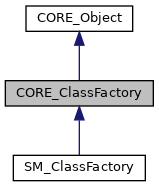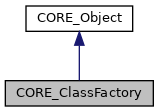this class describes a class factory to generate classes More...
#include <CORE_ClassFactory.h>


Public Member Functions | |
| virtual tMemSize | getMemorySize () const override |
| return the memory size of the class and the memory size of all its attributes/associations More... | |
| virtual tMemSize | getContentsMemorySize () const override |
| return the memory size in byte More... | |
| void | addClassFactory (CORE_UniquePointer< CORE_ClassFactory > child) |
| add to class factory More... | |
| void | clearClassFactories () |
| clear the class factories list More... | |
| virtual CORE_UniquePointer< CORE_Object > | NewInstance (const tString &name, const std::map< tString, tString > &arguments) const |
| create an unique instance of a class as a general CORE_Object More... | |
| CORE_UniquePointer< CORE_Object > | NewInstance (const tString &name) const |
| create an unique instance of a class as a general CORE_Object More... | |
| template<class T > | |
| CORE_UniquePointer< T > | NewUniqueInstance (const tString &name, const std::map< tString, tString > &arguments) const |
| create an unique instance of a class T More... | |
| template<class T > | |
| CORE_UniquePointer< T > | NewUniqueInstance (const tString &name) const |
| create an unique instance of a class T with no arguments More... | |
| template<class T > | |
| CORE_SharedPointer< T > | NewSharedInstance (const tString &name, const std::map< tString, tString > &arguments) const |
| create a shared instance of a class More... | |
| template<class T > | |
| CORE_SharedPointer< T > | NewSharedInstance (const tString &name) const |
| create a shared instance of a class with no argument More... | |
| template<class T > | |
| CORE_SharedPointer< T > | NewSharedInstance () const |
| create a shared instance of a class with same type as T with no argument More... | |
| template<class T > | |
| CORE_SharedPointer< T > | NewSharedInstance (const std::map< tString, tString > &arguments) const |
| create a shared instance of a class with same type as T More... | |
| virtual tString | toString () const override |
| get the string representation of the class More... | |
| template<class T > | |
| std::shared_ptr< T > | getSharedPointer () |
| return the shared pointer for this More... | |
| template<class T > | |
| std::shared_ptr< const T > | getConstSharedPointer () const |
| return a const shared pointer for this More... | |
| template<class T > | |
| tBoolean | isInstanceOf () const |
| test if the clas T is an instance of this class More... | |
| tString | getClassName () const |
| return the name of the class More... | |
| tString | getPointerString () const |
| retrun the pointer of the class as a string More... | |
| tString | getIdentityString () const |
| retrun the string identification of the class More... | |
Static Public Member Functions | |
| static CORE_UniquePointer< CORE_ClassFactory > | New () |
| build a new instance of default class factory More... | |
| template<class T > | |
| static CORE_SharedPointer< T > | NewSharedInstance (CORE_UniquePointer< T > &up) |
| create a shared instance of an unique pointer More... | |
| template<class T > | |
| static CORE_SharedPointer< T > | NewSharedInstance (CORE_UniquePointer< T > &&up) |
| create a shared instance of an unique pointer as a lvalue More... | |
| static tBoolean | EnableMemoryStack (const tBoolean &isMemoryChecked) |
| enable the memory stack More... | |
| static void | EnableMemoryStack () |
| enable the memory stack More... | |
| static void | DisableMemoryStack () |
| disable the memory stack More... | |
| static tBoolean | IsMemoryStackEnabled () |
| return trur if the memory stack is enabled More... | |
| static tString | MemoryStackToString () |
| get the memory stack in string More... | |
| static tIndex | GetRegisteredClassesNumber () |
| get the memory stack in string More... | |
Protected Member Functions | |
| CORE_ClassFactory () | |
| build a CORE_ClassFactory More... | |
| virtual | ~CORE_ClassFactory (void) |
| destroy a CORE_ClassFactory More... | |
Private Member Functions | |
| template<class T > | |
| std::shared_ptr< T > | setThis (std::unique_ptr< T, CORE_Object::Delete > &up) |
| set the shared pointer from an unique pointer More... | |
Private Attributes | |
| std::vector< CORE_UniquePointer< CORE_ClassFactory > > | mFactoryClasses |
| std::weak_ptr< CORE_Object > | mThis |
Detailed Description
this class describes a class factory to generate classes
Constructor & Destructor Documentation
◆ CORE_ClassFactory()
|
protected |
◆ ~CORE_ClassFactory()
|
protectedvirtual |
destroy a CORE_ClassFactory
Member Function Documentation
◆ addClassFactory()
|
inline |
add to class factory
- Parameters
-
[in] child the class factory to add
References mFactoryClasses.
Referenced by SM_Run::createClassFactories().

◆ clearClassFactories()
|
inline |
clear the class factories list
References mFactoryClasses.
◆ DisableMemoryStack()
|
inlinestaticinherited |
disable the memory stack
Referenced by CORE_Object::EnableMemoryStack().

◆ EnableMemoryStack() [1/2]
|
inlinestaticinherited |
enable the memory stack
Referenced by CORE_Object::EnableMemoryStack(), and CORE_Run::SetDebugOptions().

◆ EnableMemoryStack() [2/2]
|
inlinestaticinherited |
enable the memory stack
- Parameters
-
[in] isMemoryChecked : true to verify memory allocation of CORE_Object classes
- Returns
- true if the memroy is checked
References CORE_Object::DisableMemoryStack(), CORE_Object::EnableMemoryStack(), and CORE_Object::IsMemoryStackEnabled().

◆ getClassName()
|
inlineinherited |
return the name of the class
- Returns
- the string name of the class
Referenced by CORE_Object::getIdentityString(), and CORE_Test::testTypes().

◆ getConstSharedPointer()
|
inlineinherited |
return a const shared pointer for this
- Returns
- the shared pointer as a type T
References CORE_Object::mThis.
◆ getContentsMemorySize()
|
inlineoverridevirtual |
return the memory size in byte
- Returns
- the memory size of the storage in bytes 1 Kb = 1024 bytes 1 Mb = 1024 Kb 1 Gb = 1024 Mb 1 Tb = 1024 Gb 1 Hb = 1024 Tb
Reimplemented from CORE_Object.
References CORE_Object::getContentsMemorySize(), mFactoryClasses, and tMemSize.
Referenced by SM_ClassFactory::getMemorySize(), and getMemorySize().


◆ getIdentityString()
|
inlineinherited |
retrun the string identification of the class
- Returns
- the string identity of the class
References CORE_Object::getClassName(), and core_functions::pointerToString().
Referenced by CORE_Test::testArray(), CORE_Test::testField(), CORE_Test::testTypes(), CORE_Object::toString(), toString(), and CORE_Field< T, K, D, S, I >::toString().


◆ getMemorySize()
|
inlineoverridevirtual |
return the memory size of the class and the memory size of all its attributes/associations
- Returns
- the memory size of the class and the memory size of its attributes/associations in bytes 1 octet = 1 byte 1 Ko = 1024 bytes 1 Mo = 1024 Ko 1 Go = 1024 Mo
Reimplemented from CORE_Object.
Reimplemented in SM_ClassFactory.
References getContentsMemorySize().

◆ getPointerString()
|
inlineinherited |
retrun the pointer of the class as a string
- Returns
- the pointer of the calss as a string
References core_functions::pointerToString().

◆ GetRegisteredClassesNumber()
|
inlinestaticinherited |
get the memory stack in string
- Returns
- the string representation of the memory stack
◆ getSharedPointer()
|
inlineinherited |
return the shared pointer for this
- Returns
- the shared pointer as a type T
References CORE_Object::mThis.
◆ isInstanceOf()
|
inlineinherited |
test if the clas T is an instance of this class
- Returns
- true if the object is an instance of T
Referenced by SM_Beam::templatedSimulate().

◆ IsMemoryStackEnabled()
|
inlinestaticinherited |
return trur if the memory stack is enabled
Referenced by CORE_Object::EnableMemoryStack(), and main().

◆ MemoryStackToString()
|
inlinestaticinherited |
get the memory stack in string
- Returns
- the string representation of the memory stack
Referenced by main().

◆ New()
|
inlinestatic |
build a new instance of default class factory
- Returns
- an unique pointer of CORE_ClassFactory
References CORE_ClassFactory().

◆ NewInstance() [1/2]
|
inline |
create an unique instance of a class as a general CORE_Object
- Parameters
-
[in] name name of the class to create
- Returns
- an unique pointer to the class with name return null if the name is not recognized
References NewInstance().

◆ NewInstance() [2/2]
|
virtual |
create an unique instance of a class as a general CORE_Object
- Parameters
-
[in] name name of the class to create [in] arguments : arguments of the class (name,value)
- Returns
- an unique pointer to the class with name return null if the name is not recognized
Reimplemented in SM_ClassFactory.
References mFactoryClasses, CORE_StdPtrArray< T >::New(), and tIndex.
Referenced by NewInstance(), SM_ClassFactory::NewInstance(), NewSharedInstance(), and NewUniqueInstance().


◆ NewSharedInstance() [1/6]
|
inline |
create a shared instance of a class with same type as T with no argument
- Returns
- a shared pointer to the class with name return null if the name is not recognized
◆ NewSharedInstance() [2/6]
|
inline |
create a shared instance of a class with same type as T
- Parameters
-
[in] arguments : arguments
- Returns
- a shared pointer to the class with same type as T return null if the name is not recognized
References NewInstance().

◆ NewSharedInstance() [3/6]
|
inline |
create a shared instance of a class with no argument
- Parameters
-
[in] name name of the class to create
- Returns
- a shared pointer to the class with name return null shared pointer if the name is not recognized
References NewInstance().

◆ NewSharedInstance() [4/6]
|
inline |
create a shared instance of a class
- Parameters
-
[in] name name of the class to create [in] arguments : arguments of the class (name,value)
- Returns
- a shared pointer to the class with name return null shared pointer if the name is not recognized
References NewInstance().

◆ NewSharedInstance() [5/6]
|
inlinestatic |
create a shared instance of an unique pointer as a lvalue
- Parameters
-
[in] up unique pointer
- Returns
- a shared pointer to the class of the unique pointer
◆ NewSharedInstance() [6/6]
|
inlinestatic |
create a shared instance of an unique pointer
- Parameters
-
[in] up unique pointer
- Returns
- a shared pointer to the class of the unique pointer
◆ NewUniqueInstance() [1/2]
|
inline |
create an unique instance of a class T with no arguments
- Parameters
-
[in] name name of the class to create
- Returns
- an unique pointer to the class with name return null if the name is not recognized
References NewInstance().

◆ NewUniqueInstance() [2/2]
|
inline |
create an unique instance of a class T
- Parameters
-
[in] name name of the class to create [in] arguments : arguments of the class (name,value)
- Returns
- an unique pointer to the class with name return null if the name is not recognized
References NewInstance().
Referenced by SM_Test::grid3DParticlesTestCase(), SM_Test::linedParticlesTestCase(), SM_Run::loadBeamFromOptions(), SM_Run::loadOperatorsFromOptions(), and SM_Test::testOperators().


◆ setThis()
|
inlineprivateinherited |
set the shared pointer from an unique pointer
- Parameters
-
[in,out] up unique pointer of the class at input, points to null pointer at output
- Returns
- the shared pointer of the class
Method only calledby the friend class CORE_ClassFactory::NewSharedInstance()
References CORE_Object::mThis.
◆ toString()
|
inlineoverridevirtual |
get the string representation of the class
- Returns
- the string representation of the class
Reimplemented from CORE_Object.
References CORE_Object::getIdentityString(), and mFactoryClasses.

Member Data Documentation
◆ mFactoryClasses
|
private |
Referenced by addClassFactory(), clearClassFactories(), getContentsMemorySize(), NewInstance(), and toString().
◆ mThis
|
privateinherited |
Referenced by CORE_Object::getConstSharedPointer(), CORE_Object::getSharedPointer(), and CORE_Object::setThis().
The documentation for this class was generated from the following files:
